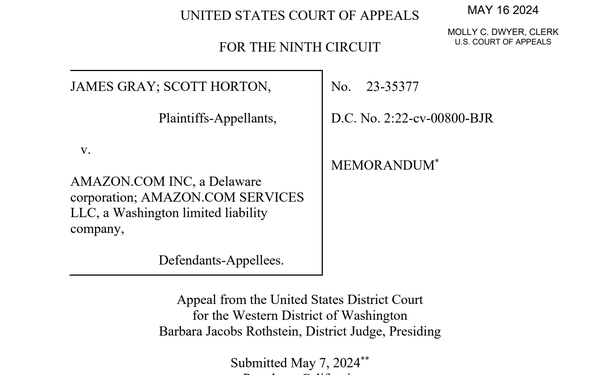Amazon Prevails In Privacy Battle Over Alexa Ad Targeting
- by Wendy Davis @wendyndavis, May 16, 2024

Siding with Amazon, a federal appellate court refused to revive a class-action complaint alleging that the company wrongly targets ads to consumers based on their interactions with Alexa-enabled devices.
In an unsigned opinion issued Thursday, a three-judge panel of the 9th Circuit Court of Appeals upheld U.S. District Court Judge Barbara Rothstein's ruling that Amazon notified users about its practices in a privacy policy.
“The district court correctly found that Amazon disclosed the relevant conduct in its privacy notice,” Circuit Judges Danielle Forrest, Patrick Joseph Bumatay and District Court Judge James Donato wrote.
The ruling comes in a battle dating to 2022, when Ohio resident James Gray and Massachusetts resident Scott Horton alleged in a class-action complaint that Amazon violated Alexa users' privacy, and engaged in misleading and unfair conduct, by serving targeted ads based on voice interactions.
advertisement
advertisement
They sued soon after researchers from the University of Washington, University of California-Davis, University of California-Irvine, and Northeastern University posted the paper “Your Echoes are Heard: Tracking, Profiling, and Ad Targeting in the Amazon Smart Speaker Ecosystem,” which concluded that Amazon “processes voice data to infer user interests.” The authors didn't allege that Amazon secretly listened to conversations, or directly shared voice recordings with third parties.
After the paper came out, Amazon acknowledged it targeted ads to consumers based on their transactions with Alexa. The company also said it “is not in the business of selling data,” and doesn't share Alexa requests with ad networks.
“Similar to what you'd experience if you made a purchase on Amazon.com or requested a song through Amazon Music, if you ask Alexa to order paper towels or to play a song on Amazon Music, the record of that purchase or song play may inform relevant ads shown on Amazon or other sites where Amazon places ads,” the company stated in response to the research paper.
Rothstein, who presides in the Western District of Washington, dismissed the lawsuit last year, writing that the use of voice data for ad purposes was “contemplated in the applicable policies.”
Gray and Horton then appealed to the 9th Circuit, arguing that Amazon's disclosures were “at best ambiguous,” and that its “Alexa-specific” policies don't say anything about targeted advertising.
They also said Amazon told media outlets -- including NBC and The New York Times -- that Alexa doesn't use voice recordings for targeted advertising.
A Utah State University marketing professor sided with the consumers, arguing in a friend-of-the-court brief that Amazon “obfuscated the purposes for which it was using consumer data.”
Amazon countered in papers filed last November that Alexa's privacy policy discloses that the company “processes and retains” Alexa interactions in order “to provide, personalize, and improve our services.”
The company also argued that other documents -- such as an Amazon.com privacy notice, Amazon.com conditions of use, and answers to frequently asked questions -- include disclosures about the use of personal information for advertising.
“In sum, all of these interrelated terms and disclosures make clear that customers’ interactions with the Alexa service might be used to serve interest-based or personalized advertisements, unless the user chooses to opt out,” Amazon wrote.


